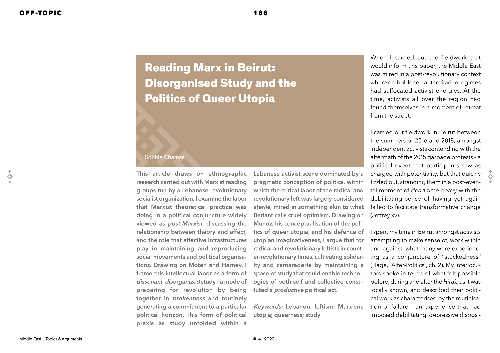Reading Marx in Beirut: Disorganised Study and the Politics of Queer Utopia
This article draws on ethnographic research carried out with Marxist reading groups run by a Lebanese revolutionary socialist organization. I examine the labor that Marxist theoretical practice was doing in a political conjuncture widely viewed as post-Marxist , discussing the relationship between t...
Đã lưu trong:
| Xuất bản năm: | Middle East - Topics & Arguments |
|---|---|
| Tác giả chính: | |
| Định dạng: | Artikel (Zeitschrift) |
| Ngôn ngữ: | Tiếng Anh |
| Được phát hành: |
Philipps-Universität Marburg
2020
|
| Những chủ đề: | |
| Truy cập trực tuyến: | Truy cập trực tuyến |
| Các nhãn: |
Không có thẻ, Là người đầu tiên thẻ bản ghi này!
|
| Tóm tắt: | This article draws on ethnographic research carried out with Marxist reading groups run by a Lebanese revolutionary socialist organization. I examine the labor that Marxist theoretical practice was doing in a political conjuncture widely viewed as post-Marxist , discussing the relationship between theory and affect, and the role that affective infrastructures play in maintaining and reproducing social movements and political organisations. Drawing on Moten and Harney, I frame this intellectual labor as a form of dissonant , disorganized study - a mode of preparing for revolution by being together in brokenness and routinely generating a commitment to a particular political horizon. This form of political praxis as study unfolded within a Lebanese activist scene dominated by a pragmatic conception of politics, within which the critical labor of the radical and revolutionary left was largely considered sterile , mired in something akin to what Berlant calls cruel optimism. Drawing on Munoz, his conceptualisation of the politics of queer utopia, and his defence of utopian imaginativeness, I argue that for radical and revolutionary leftists in counter-revolutionary times, cultivating solidarity and camaraderie by maintaining a space of study that could enable technologies of both self and collective constituted a productive political act. |
|---|---|
| DOI: | 10.17192/meta.2020.14.8021 |
